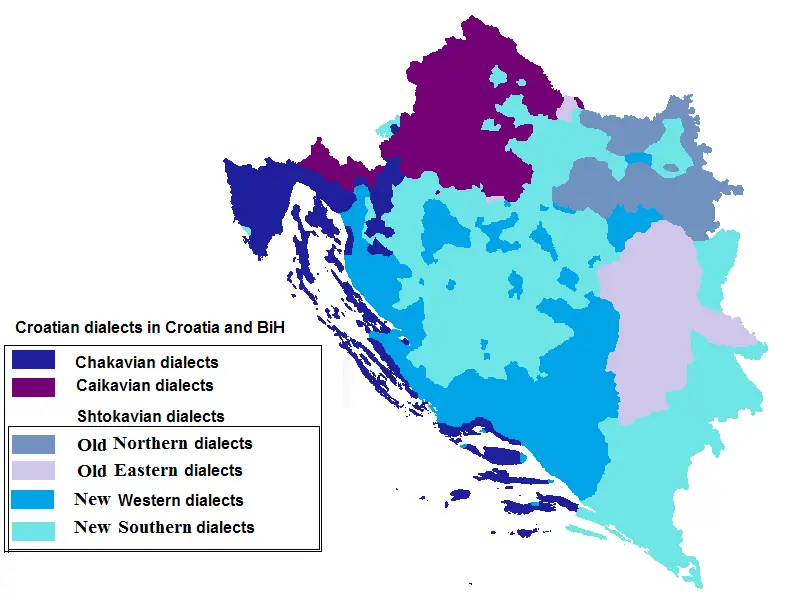I’ll be frank, learning Croatian is difficult unless you happen to have a Slavic language as your mother tongue. It has been listed as among the most difficult languages to pick up in the world on multiple occasions, and I’ll also be frank when I say many expats don’t bother trying to learn it. Do you absolutely need to be able to speak Croatian? Honestly, no. You’d get by. I’ve mentioned that the English language proficiency among Croats is very high. Should you learn to speak Croatian? Yes. And not only because it is the respectful thing to do when living in a country where Croatian is the official language, but because it will help you to adapt in a way that nothing else even comes close to.
Do you need to be fluent? Absolutely not. Croats are (unless the person is very ignorant to the world) aware that Croatian is difficult to learn. That said, as I mentioned before, any attempt at learning shows respect and will be greatly appreciated and even admired if you manage to get a bit more advanced with your skills.
It’s true when they say that the earlier you begin learning something, the more quickly and easily you’ll master it. Croatian kids converse very well in English, many of them take extra lessons outside of school, and a lot of them enjoy watching YouTube videos by American content creators and reading books written by British authors. I’ve met Croatian kids who actually don’t even like to speak in Croatian, choosing to instead speak in English among themselves, and lapping up the chance to practice to what is often fluency.
Given the fact that the English language is so desired and so widely spoken across the world, those who have English as a first language often speak only that. That of course isn’t always the case and claiming so would be a wild generalisation, but at age 13 with raging hormones and wondering whether or not Darren from the year above fancies you or not, it isn’t really the best time to soak up the ability to tell everyone what you did on holiday in French. This puts Brits especially at a disadvantage when it comes to properly learning foreign languages.
Croatian is made up of dialects, there are three main ones; Kajkavian, Shtokavian, and Chakavian, but the reality is that the way in which people speak can alter from town to town, let alone region to region. Someone from Brač (or as they call it – Broč) will struggle to understand someone from Zagorje, and vice versa. The way the time is told in some parts of the country is different from in another, and Dalmatian is a language with many unfortunately near-extinct words of its own. Did I mention that Dubrovnik language is also one of its own in many respects? Don’t get me started on different words being used on different islands which are a mere stone’s throw away from each other. There are words that the now dying generation use which, when they depart this life, will tragically go with them.
Some words in Croatian are so similar to each other in how they sound but mean wildly different things. Proljev is diarrhoea, and preljev is dressing. I cannot imagine a salad slathered in the former would be all that appealing. A friend once accidentally called her mother in law (svekrva) her ‘sve kurva’ (kurva means whore). Another person I know once said he had a headache (boli me glava), but ended up saying ‘glavić’ instead, which is part of the male sex organ. Given that ‘glava’ means head, you can probably guess which part ‘glavić’ is. My point is that this is a language which is intricate, and the little things make a big difference.
Croatian is a very colourful language. The ways people swear in this country and the creativity used is quite the art form in itself. The genitals of sheep, mice and Turkish people are dropped into conversations quite casually, and people refer to things being easy as a ‘cat’s cough’ or even as ‘p*ssy smoke’. I’ll be here all day if I carry on and explain all of their meanings, but rest assured, Croatian makes up for its infuriating difficulties with its imaginative creativity.
How do I begin learning Croatian?
Turn on your TV, your radio, and start reading news in Croatian language. You’d be surprised how much information having the radio or TV on in the background actually puts into your brain without you even actually listening. Children’s books are also extremely helpful if you’re starting from scratch.
Find a private Croatian teacher
Word of mouth and expat groups are your friend here. People are always looking for Croatian teachers and seeking recommendations for them. One question in an expat group will likely land you with several names of teachers with whom other users have had good experiences and progress with their language skills. Some teachers hold small classes, some do lessons over Skype, Zoom or another similar platform, and others will meet one on one.
Language exchanges
There are also language exchanges offered informally, where a Croat will teach you Croatian in exchange for you teaching them English, German, French, Spanish, or whatever language is in question. You both help each other learn the other’s skill, and it is a very equal affair.
Take a Croatian language course
Certain faculties and Croatian language schools, such as Croaticum, offer Croatian language and culture courses for foreigners. Did you know that you can also apply for residence based on studying here? There are different types of courses available and at reasonable prices. Some of them are even free! From semester-long courses on language and culture spanning 15 weeks and over 200 lessons to one month courses of 75 lessons spanning 4 weeks, there is something for everyone, depending on how much time they can or want to put into it. There are also others which offer Croatian language courses online, such as HR4EU, Easy Croatian, the Sputnik Croatian Language Academy, CLS and more.
If you have a Croatian partner, don’t rely entirely on them
Have them help you to learn, but don’t completely rely on them to the point that they’re your buffer stopping you from attempting to learn and improve. Many expats make this error, and their Croatian spouse actually ends up becoming an unwilling barrier to them picking up at least bits of the language in their perfectly noble attempts at helping. Stick some notes on household items with their names in Croatian. You’ll be calling a bed a krevet, a door a vrata, a wall a zid, a floor a pod, a window a prozor and a glass a čaša (or a žmul, if you want to take a step even further and learn a little old Dalmatian), in no time.
Age is a factor, so don’t run before you can walk
It isn’t a popular thing to say, but age does play a role when it comes to learning new skills, whatever they may be. Kids soak up new languages like sponges because their brains are developing, but with each passing year of our lives, that sponge gets a little bit drier. Croatian isn’t Spanish, it has very complex rules which are unlike what native English speakers have grown up using. You might find that you never truly master Croatian, and you might also feel as if you’re behind and not picking it up as quickly as you’d like to. This is normal, and it’s fine. Moving to or spending any significant amount of time in another country is a huge shift and for some people, throwing themselves into learning the language is last on the list in comparison to working out how to make ends meet or set up their lives. Nobody should be shamed for not having the same priorities as others might have. For some people, being a polyglot is just part of their nature, for others, it just isn’t. Patience is a virtue. Many expats will tell you that they understand much more Croatian than they’re able to speak, and if you can reach that level (which takes a while), you’re already much more than halfway there.
If you’re a member of the Croatian diaspora, the State Office for Croats Abroad has has scholarships available
If you’re a member of the Croatian diaspora, even if you don’t have Croatian citizenship and don’t have any intention of moving to or working in Croatia, you can still learn Croatian in various locations in Croatia and reconnect with your family’s roots and heritage.
I’m a translator. I translate from Croatian into English all day long, I could talk about my love and endless interest in linguistics all day (so I’ll stop now) and I can tell you that the two languages are very different in almost every aspect. It will not come easily, but genuine desire and consistent effort will surprise you with its results. Listen to Croatian, watch things in Croatian with English subtitles, have your spouse, friends and Croatian family members help you, don’t fear making mistakes and your confidence will grow. You will get there.
For more How to Croatia articles, which explore living in and moving to Croatia and span everything from getting health insurance to taking your dog on a ferry, make sure to check out our dedicated lifestyle section.











